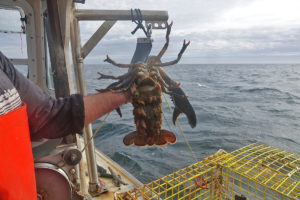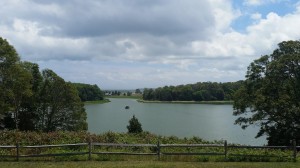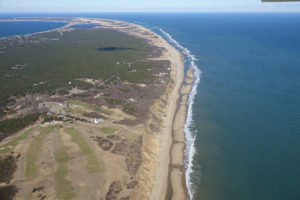 HYANNIS — Interstate fishing managers are starting the process of trying to reduce the amount of lobster fishing gear off the East Coast in an attempt to help save a declining species of rare whale.
HYANNIS — Interstate fishing managers are starting the process of trying to reduce the amount of lobster fishing gear off the East Coast in an attempt to help save a declining species of rare whale.
The Atlantic States Marine Fisheries Commission announced this month that it would consider options designed to reduce vertical lobster fishing lines in the water by as much as 40 percent. The lines pose a threat to the North Atlantic right whale, which is one of the rarest marine mammals in the world.
The commission said it would try to reduce the amount of gear with a combination of trap limits, seasonal closures, changes to gear configuration and other methods. The rules are under development and it will take months before they come up for public hearings.
Beth Casoni, executive director of the Massachusetts Lobsterman’s Association, said they’re taking a close look at the proposal.
“We’re looking for real options that will help mitigate interactions with the North Atlantic Right Whale,” she said.
Casoni is concerned that other areas won’t be doing as much to protect whales as they are off Massachusetts where several trap closures are already in place.
“Going forward, we’re hopeful that other states will get on board and implement some real conservation changes,” Casoni said.
The commission said in a statement that the drive to reduce lines in the water is “in response to concerns about the North Atlantic right whale population and the potential impacts of whale conservation measures on the conduct of the lobster fishery.” But some lobster fishermen said they need more details about the effort before they will get on board.
“What we do needs to be right sized for what’s going on with whales. Right sized to the risk our fishery actually poses to the whales,” said Patrice McCarron, executive director of the Maine Lobstermen’s Association. “We want to do our part and have that solution meet the risk we actually have.”
In Massachusetts, Casoni said there needs to be a balance of strong conservation measures with protections for the industry.
Massachusetts lobstermen will soon be testing a new type of rope that will break easier if caught up in a whale.
The Canadian government also outlined efforts to protect the animals, which migrate from U.S. to Canadian waters, on Thursday.
Fisheries and Oceans Canada stated that it’s changing an area of ocean that is closed to snow crab and lobster fishing to include the area where 90 percent of the whales were sighted during the busiest parts of last year’s fishing season. The agency’s also re-introducing a mandatory speed restriction for some vessels that travel in the western Gulf of St. Lawrence starting on April 28.
The lobster fishing industry is a major economic driver in both Canada and New England, particularly in Maine, the largest lobstering state in the U.S. Maine lobster has been worth more than $400 million at the docks for four years in a row after never previously reaching that number.
The fishermen work the same waters as the North Atlantic right whales, which are believed to number about 411, and have suffered from poor reproduction and high mortality in recent years. They numbered more than 480 as recently as 2010, and their recent population loss has alarmed conservationists.
“It cannot be too little, too late,” said Jane Davenport, a senior staff attorney with the group Defenders of Wildlife. “We just don’t have that luxury of time anymore given what we know now about this species.”
























